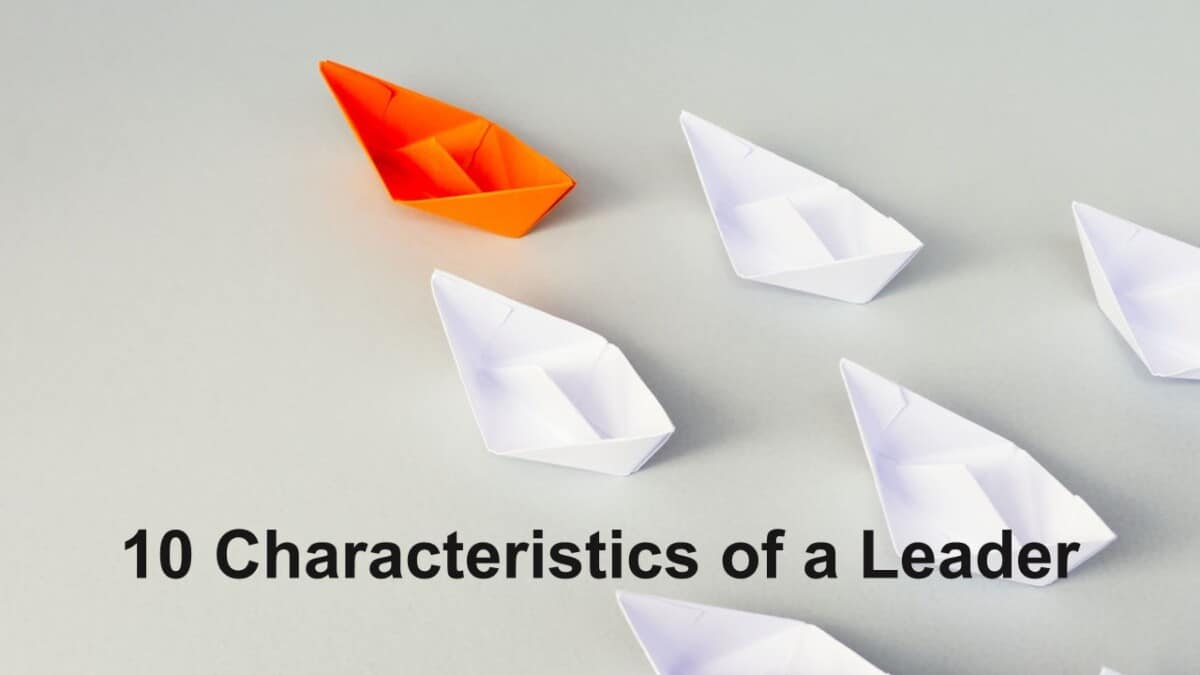Share:
Brad Federman, Contributor

Have you ever looked at great leaders and wondered what makes them truly exceptional? Is it their ability to inspire and motivate their teams? Or their unwavering commitment to their vision?
Leadership is a quality that has been cherished throughout history. It is a quality that is crucial to steering organizations, movements, and countries toward a better future. However, the characteristics of a good leader have changed over time.
As we enter a new era of unprecedented technological and social change, the characteristics of effective leadership are rapidly evolving, and the future will require leaders to adapt if they are to succeed and navigate the challenges ahead.
There are 10 characteristics a leader needs to thrive and lead teams that thrive. Leaders who are visionary, adaptive, empathetic, innovative, transparent, collaborative, resilient, ethical, inclusive, lifelong learners will be better equipped for future challenges and better able to help their teams succeed.
In this article, we’ll explore these 10 key characteristics that every leader needs to thrive in the years to come. Whether you’re a seasoned executive or an aspiring leader, join me as we dive into the world of future leadership and discover what it takes to lead with purpose, clarity, and impact.
Are you ready? Let’s discuss the ten characteristics of a leader that are needed for the future.
Visionary
A visionary is someone who has the ability to think creatively and imaginatively about the future and who is able to develop innovative and transformative ideas that have the potential to bring about positive change. A visionary is often someone who can see possibilities that others may not, and who is willing to take risks to turn their ideas into reality. Visionaries may work in all fields including science, technology, business, politics, and the arts, and their contributions can have a lasting impact on society.
Being a visionary requires not only creativity and imagination but also the ability to communicate and inspire others to share in their vision and work towards a common goal. In a rapidly changing world, having a long-term vision is critical in leading organizations toward success.
Like him or hate him, Elon Musk, the founder of Tesla, SpaceX, Neuralink, and The Boring Company is a visionary. He has a reputation for pushing the boundaries of what is possible and is known for his ambitious goals and innovative ideas.
Nelson Mandela also embodies visionary leadership. He was crucial in ending apartheid and establishing a democratic government in South Africa. After spending 27 years in prison for his activism, Mandela could have fallen prey to hatred and anger, but upon his release, he worked tirelessly to promote reconciliation and equality in his country.
Mandela’s vision for a democratic and multiracial South Africa was based on the principles of forgiveness, compassion, and social justice, and he was able to bring people of different races and backgrounds together to work toward a common goal at a time when others could not see that future.
Adaptive
The ability to adjust to different circumstances and new conditions is needed for the future. The world is constantly changing, and leaders need to be able to adapt to these changes. They should be able to pivot their strategies, change their approach, and be flexible in their decision-making. Leaders who are not able to adapt to change will quickly fall behind and become irrelevant.
Satya Nadella, CEO of Microsoft, is an excellent example of an adaptive leader. When Nadella took over as CEO in 2014, he faced the challenge of leading a company that was struggling to keep up with the rapid changes in the technology industry.
Rather than simply continuing on the path set by his predecessor, Nadella recognized the need for Microsoft to adapt and transform in order to stay relevant. He focused on shifting the company’s focus towards cloud computing and artificial intelligence and initiated a major restructuring effort to streamline operations and increase agility.
Empathetic
There was a hit song with the lyrics “What the world needs now is love, sweet love, It’s the only thing that there’s just too little of,” and those lyrics still ring true today. Maybe we can’t love everyone, but if we replaced the word “love” with “empathize with” it is more achievable.
Leaders who understand and care about the needs of their team are more likely to be successful. They should be able to put themselves in the shoes of their team members and understand their perspectives. This can lead to better communication, collaboration, and team morale.
Jacinda Ardern, the Prime Minister of New Zealand, is known for her compassionate and empathetic leadership style, particularly in times of crisis. During the Christchurch mosque shootings in 2019, Ardern showed great empathy and support for the Muslim community, wearing a headscarf as a sign of respect and comfort, and declaring that “they are us.” She also implemented swift policy changes to prevent similar tragedies from happening again.
Ardern’s leadership during the COVID-19 pandemic also showcased her empathetic approach. She communicated regularly and transparently with the public, acknowledging the challenges and anxieties people were facing, and taking decisive action to protect the health and well-being of New Zealanders.
Innovative
Disruption is everywhere because innovation is now exponentially faster, and there is more of it due to technological advances. In a rapidly changing world, innovation is critical to staying ahead of the curve. Leaders should be able to think creatively and come up with new ideas and solutions to problems. They should encourage their team to think outside the box and try new things.
Jeff Bezos, the founder and former CEO of Amazon, is known for his relentless focus on innovation, constantly pushing the boundaries of what’s possible in the world of e-commerce and beyond.
Under Bezos’ leadership, Amazon has launched numerous groundbreaking products and services, such as Amazon Prime, Alexa, and Amazon Web Services (AWS). Bezos also pioneered the use of data analytics and artificial intelligence to improve customer experience and drive business growth.
In addition to his work at Amazon, Bezos has been a leader in the private space industry through his company Blue Origin. He has ambitious plans for space exploration and colonization and has made significant investments in developing reusable rockets and spacecraft.
Transparent
We live in a bold new world where people demand transparency. Being transparent builds trust. In an age of transparency, leaders should be open and honest with their teams. They should be transparent about their decision-making process and communicate the reasoning behind their decisions. This can lead to greater trust and respect from their team.
Arne Sorenson, the former CEO of Marriott International, was widely recognized as a transparent leader, particularly during the COVID-19 pandemic. Sorenson was diagnosed with pancreatic cancer in 2019 but continued to lead the company until his passing in February 2021.
During the pandemic, Sorenson was open and honest about the challenges facing Marriott, including the devastating impact on the travel industry and the difficult decisions the company had to make in response.
He communicated regularly with employees, shareholders, and customers, providing updates on the company’s response and the steps being taken to protect the health and safety of guests and employees. He did all of this while being transparent about his own personal health battle.
Collaborative
Collaboration only happens when people feel safe to put themselves out there. What is magical about collaboration is that it creates commitment, buy-in, and accountability.
Leaders who are able to collaborate with their teams and other organizations are more likely to be successful. They should be able to work towards a common goal and be open to different perspectives. Collaboration can lead to better problem-solving and greater innovation.
A truly collaborative leader is Indra Nooyi, the former CEO of PepsiCo. Nooyi is known for her inclusive leadership style, which emphasizes collaboration, diversity, and teamwork.
During her tenure at PepsiCo, Nooyi implemented a number of initiatives to encourage collaboration and innovation, such as creating cross-functional teams and breaking down silos within the organization. She also placed a strong emphasis on diversity and inclusion, recognizing that different perspectives and backgrounds can lead to better outcomes.
Nooyi was also known for collaborating with external partners, such as suppliers and customers, to drive innovation and growth. She worked closely with PepsiCo’s bottlers and retailers to develop new products and marketing strategies and established partnerships with organizations focused on sustainability and social responsibility.
Overall, Nooyi’s collaborative leadership style helped to foster a culture of innovation and teamwork at PepsiCo and set an example for other leaders to follow. Her emphasis on diversity and inclusion also helped to create a more inclusive and welcoming workplace for employees of all backgrounds.
Resilient
The ability to get back up after failing separates those who succeed from those who fall behind or fall off. Resiliency is a superpower in today’s workplace. Leaders should be able to bounce back from failures and setbacks. They should be able to learn from their mistakes and use that knowledge to improve. Resilient leaders are more likely to inspire their team and persevere through difficult times.
One leader who best illustrates resiliency is Angela Merkel, the former Chancellor of Germany. Merkel faced numerous challenges throughout her tenure, including the global financial crisis of 2008, the European debt crisis, and the ongoing refugee crisis.
Despite these challenges, Merkel remained steadfast and resilient, consistently working to find solutions and bring people together. She was known for her ability to stay calm under pressure and make tough decisions, even in the face of strong opposition.
During the refugee crisis, Merkel faced criticism from both inside and outside Germany for her open-door policy toward refugees. However, she remained committed to her position and worked to find practical solutions to the challenges posed by the influx of refugees.
Throughout her time in office, Merkel also showed resilience in her personal life, overcoming health issues and family challenges with grace and determination.
Ethical
Ethics have been debated since the beginning of time. We are still having many of the same debates that were had during the times of Aristotle and Plato. However, people know good ethics when they see them.
Leaders should be able to make decisions based on their values and principles. They should be honest, trustworthy, and act with integrity. Ethical leaders are more likely to inspire their team and gain the trust and respect of others.
One leader who has demonstrated strong ethics is Tim Cook, the CEO of Apple Inc. Cook has been a vocal advocate for social justice and human rights, and he has made ethical leadership a priority at Apple.
Under Cook’s leadership, Apple has made a number of commitments to social responsibility, including reducing its carbon footprint, improving labor conditions for its suppliers, and promoting diversity and inclusion within the company. Cook has also been a vocal advocate for privacy and data security and has taken a strong stance against government efforts to weaken encryption and undermine user privacy.
Inclusive
Inclusion is one of the most talked about topics in business today. Leaders should be able to create a diverse and inclusive environment for their teams. They should value different perspectives and backgrounds and ensure everyone feels heard and valued. Inclusive leaders are more likely to inspire their teams and create a positive and productive work environment.
One leader that people may not immediately think of who has shown an inclusive mindset and approach is José Andrés, the chef and founder of World Central Kitchen.
Andrés is known for his humanitarian work and his commitment to feeding people in times of crisis, including during natural disasters and other emergencies. He has taken an inclusive approach to his work, partnering with local communities and organizations to provide food and resources to those in need.
Andrés has also been a vocal advocate for immigrant rights and has spoken out against policies that seek to marginalize or exclude immigrants. He took a strong stance against the Trump administration’s immigration policies and has worked to provide support and resources to immigrant communities.
Lifelong Learner
“Learn or die” is our choice these days. Choosing not to consistently learn and be curious means you will quickly become irrelevant. We all must be lifelong learners to thrive in the future.
Leaders should be committed to continuous learning and improvement. They should seek out new knowledge and skills and be open to feedback. Lifelong learners are more likely to stay ahead of the curve and inspire their team to do the same.
One leader who has consistently role-modeled being a lifelong learner is Warren Buffett, the CEO of Berkshire Hathaway and one of the world’s most successful investors.
Buffett is known for his voracious reading habit and his commitment to continuous learning. He has credited much of his success to his ability to learn from others and to constantly seek out new information and perspectives.
Buffett has also been a vocal advocate for education and has worked to promote literacy and learning initiatives in his community. He has even established his own educational foundation, the Buffett Early Childhood Fund, which supports early childhood education programs in the United States.
Setting the Stage for Future Success
The world is changing at an unprecedented pace, and the demands of effective leadership are evolving along with it. The 10 characteristics we’ve explored in this article represent the qualities that will enable leaders to thrive in the future.
By developing a clear vision, fostering adaptability, and prioritizing empathy, leaders can build stronger, more resilient organizations that are equipped to navigate the challenges ahead.
Remember, leadership is not about being perfect or having all the answers. It’s about committing to a vision, inspiring others to join you on your journey, and cultivating a culture of trust, collaboration, and innovation.
So, whether you’re a CEO, manager, or team leader, I challenge you to embrace these 10 characteristics and become the kind of leader people are proud to follow. Because when we lead with purpose, clarity, and impact, we have the power to change the world or, at the very least, our little corner of it.

Brad Federman helps leaders and companies, “Discover and live their possible.” Amazing results occur when organizations engage employees and customers, build resilient and bulwark relationships, as well as create collaborative and agile cultures. He is the President of PerformancePoint LLC., an international consulting and training firm focused on driving results through strong leadership and healthy cultures.


